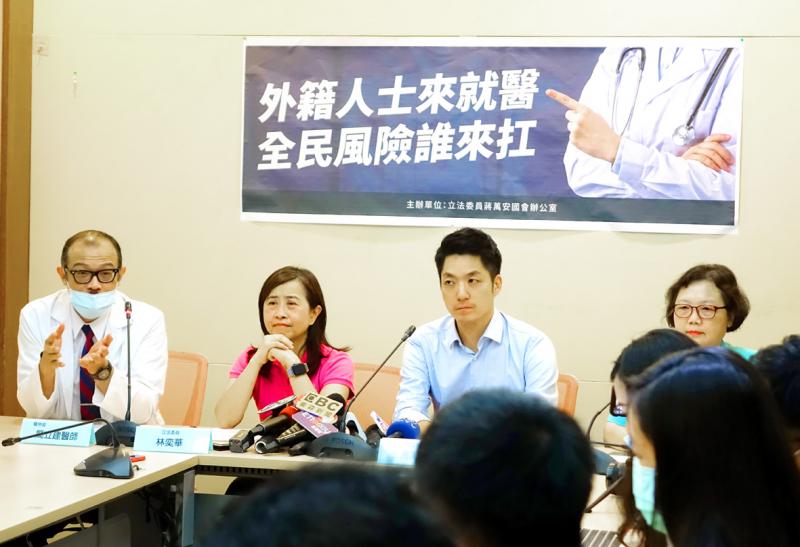Chinese Nationalist Party (KMT) Legislator Chiang Wan-an (蔣萬安) yesterday urged the central government to postpone and reconsider its policy on easing border restrictions for some medical tourists starting on Saturday.
Citing the stability of the local COVID-19 situation, the Central Epidemic Command Center on Wednesday last week announced that starting on Saturday, foreign medical patients could apply for treatment in Taiwan, except for those with non-urgent medical needs, such as physical examinations and aesthetic medicine.
On March 19, border controls were tightened due to the coronavirus, restricting the entry of non-Taiwanese and interrupting treatments for some foreigners, as they were no longer able to travel to Taiwan, the center said.

Photo: Wang Yi-sung, Taipei Times
Many healthcare workers, as well as other members of the public, are “very concerned” about the policy, Chiang told a news conference in Taipei yesterday, adding that the announcement resulted in a backlash from medical personnel.
Many people have doubts about the government introducing the policy when the COVID-19 situation abroad is still serious, he said.
Chiang asked whether the safety of Taiwanese and the nation’s frontline medical staff should be risked for the healthcare rights of foreign patients.
He questioned whether there had been sufficient communication with healthcare workers to reach a consensus, and whether adequate measures were being taken to support the policy.
The central government should more clearly explain the policy, he said, adding that it should reveal estimates of how many foreign patients would be entering under the policy, from which nations and for what treatments.
Chiang called on the Ministry of Health and Welfare to postpone the policy’s implementation until there has been more communication and preparation.
KMT Legislator Lin Yi-hua (林奕華) asked whether there were diplomatic or economic factors behind the ministry’s decision to allow foreign medical patients entry at this time.
The ministry should listen to the voices of the nation’s frontline medical workers, she said, urging the ministry to reconsider the policy.
Taiwan Medical Alliance for Labor Justice and Patient Safety representative Chien Li-chien (簡立建) said that before announcing such policies, the government should communicate with the nation’s frontline medical workers.
Taiwan Union of Nurses Association standing director Lin Hsiu-chu (林?珠) said there would be gray areas involved in granting foreign patients entry, as definitions might vary for aesthetic procedures and physical examinations.
Nationality is not important when helping patients, but it is crucial to protect the nation’s medical personnel and healthcare resources, she said.

Taiwanese can file complaints with the Tourism Administration to report travel agencies if their activities caused termination of a person’s citizenship, Mainland Affairs Council Minister Chiu Chui-cheng (邱垂正) said yesterday, after a podcaster highlighted a case in which a person’s citizenship was canceled for receiving a single-use Chinese passport to enter Russia. The council is aware of incidents in which people who signed up through Chinese travel agencies for tours of Russia were told they could obtain Russian visas and fast-track border clearance, Chiu told reporters on the sidelines of an event in Taipei. However, the travel agencies actually applied

Japanese footwear brand Onitsuka Tiger today issued a public apology and said it has suspended an employee amid allegations that the staff member discriminated against a Vietnamese customer at its Taipei 101 store. Posting on the social media platform Threads yesterday, a user said that an employee at the store said that “those shoes are very expensive” when her friend, who is a migrant worker from Vietnam, asked for assistance. The employee then ignored her until she asked again, to which she replied: "We don't have a size 37." The post had amassed nearly 26,000 likes and 916 comments as of this

New measures aimed at making Taiwan more attractive to foreign professionals came into effect this month, the National Development Council said yesterday. Among the changes, international students at Taiwanese universities would be able to work in Taiwan without a work permit in the two years after they graduate, explainer materials provided by the council said. In addition, foreign nationals who graduated from one of the world’s top 200 universities within the past five years can also apply for a two-year open work permit. Previously, those graduates would have needed to apply for a work permit using point-based criteria or have a Taiwanese company

US President Donald Trump said "it’s up to" Chinese President Xi Jinping (習近平) what China does on Taiwan, but that he would be "very unhappy" with a change in the "status quo," the New York Times said in an interview published yesterday. Xi "considers it to be a part of China, and that’s up to him what he’s going to be doing," Trump told the newspaper on Wednesday. "But I’ve expressed to him that I would be very unhappy if he did that, and I don’t think he’ll do that," he added. "I hope he doesn’t do that." Trump made the comments in